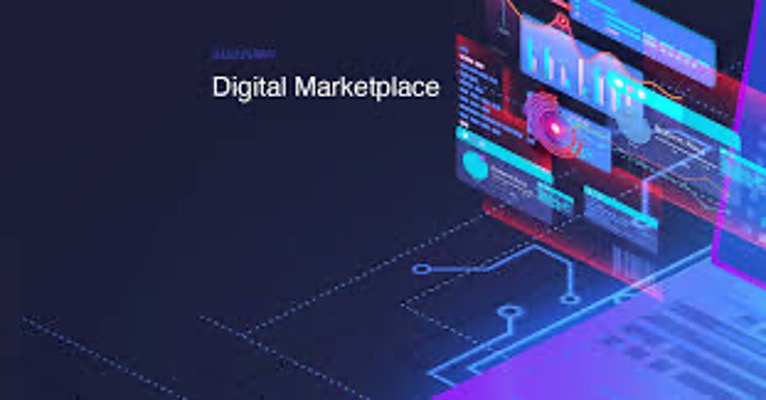In the rapidly evolving world of commerce, digital marketplaces have emerged as powerful platforms that enable the buying and selling of goods, services, and information between individuals, businesses, and governments. These platforms have transformed traditional business models, introducing new ways for consumers and enterprises to interact, engage, and transact. As industries like telecommunications, Information Technology (IT), and Public Government embrace digital marketplaces, the role of artificial intelligence (AI) has become increasingly vital in enhancing customer experience, streamlining operations, and driving innovation. In this blog, we’ll explore the concept of digital marketplaces, how they are used across different sectors, and the significant influence of AI in shaping these experiences.
What Are Digital Marketplaces?
A digital marketplace is an online platform that connects buyers and sellers in a digital environment. These platforms serve as intermediaries that facilitate transactions, often offering additional features such as payment processing, dispute resolution, and product/service reviews. Unlike traditional e-commerce websites, digital marketplaces usually allow multiple vendors to list their offerings in a shared virtual space, making them an essential part of the global economy.
Digital marketplaces come in various forms, primarily categorized as private, public, and hybrid. Each type of marketplace has its own characteristics, use cases, and benefits, often catering to different needs and types of users. Here’s a breakdown of each:
1. Private Digital Marketplaces
A private digital marketplace is a closed platform where access is restricted to a specific group of buyers and/or sellers. Participation in these marketplaces is typically controlled through invitation, membership, or approval.
Characteristics:
- Access Control: Only authorized participants can access the marketplace (e.g., by invitation or after meeting certain criteria).
- Exclusivity: Transactions are often limited to a select group of businesses or individuals, fostering a more curated and controlled environment.
- Custom Terms: Buyers and sellers may have the ability to negotiate specific terms, contracts, and pricing, offering a more personalized experience.
- Security: High level of security and confidentiality, since transactions typically involve trusted parties.
Uses:
- B2B Transactions: Private marketplaces are commonly used for business-to-business (B2B) transactions where confidentiality, trust, and exclusive deals are important.
- Supply Chain Management: Companies often create private marketplaces to interact with suppliers, manufacturers, or distributors within a controlled environment.
- Luxury Goods: Certain high-end products, such as rare art or luxury items, may be sold through private platforms where discretion and limited access are essential.
2. Public Digital Marketplaces
A public digital marketplace is open to anyone who meets the platform’s basic entry requirements, usually just a registration or account setup. These platforms are widely accessible to the general public and facilitate transactions between buyers and sellers on a large scale.
Characteristics:
- Open Access: Anyone can join, buy, or sell on the platform (subject to basic registration and compliance with platform rules).
- Wide Reach: Public marketplaces typically have a large user base, providing more opportunities for buyers and sellers to find each other.
- Standardized Terms: Pricing, terms, and conditions are often standardized or regulated by the platform, providing simplicity but less flexibility.
- Competitive Pricing: Due to the larger pool of participants, buyers often benefit from more competitive pricing.
Uses:
- Consumer-to-Consumer (C2C): Platforms like eBay, Etsy, or Craigslist are examples of public marketplaces where individuals can buy and sell a wide range of goods.
- Business-to-Consumer (B2C): E-commerce platforms like Amazon, Alibaba, and Walmart’s online store operate as public marketplaces for businesses to sell to consumers.
- Services: Public digital marketplaces for services, like Fiverr or Upwork, connect freelancers with clients on a global scale.
- Mass Market Goods: Public platforms are ideal for mass-market products where price competition and variety are key drivers for success.
3. Hybrid Digital Marketplaces
A hybrid digital marketplace combines elements of both private and public marketplaces. These platforms may allow open access to a broad range of users but offer specific private or exclusive spaces within the marketplace for certain users, products, or services.
Characteristics:
- Dual Access: A hybrid marketplace allows both public-facing transactions and private or restricted sections. For instance, it may have public listings but also offer private, invite-only features or auctions.
- Segmentation: Some segments of the marketplace may operate with stricter access controls, while others remain open.
- Customization: Offers the flexibility of creating customized experiences for different types of users (e.g., VIP buyers, business buyers, etc.).
- Scalability: Hybrid marketplaces can cater to both large-scale, general transactions and more exclusive, high-value deals in different sections of the same platform.
Uses:
- B2B/B2C Combination: Platforms like Amazon allow both consumers to buy from retailers (public) and businesses to engage in private wholesale transactions (private) with suppliers and distributors.
- Marketplace for Niche Goods: A hybrid platform could cater to both general consumers and a specific group of collectors or niche markets.
- Auction Platforms: Platforms like eBay can be seen as hybrid marketplaces, where common goods can be purchased publicly, but rare or collectible items can be auctioned off privately or with exclusive access.
- Enterprise Software Marketplaces: A hybrid model might be used for digital platforms like Salesforce’s AppExchange or Microsoft’s Azure Marketplace, where enterprises can access both public apps and private integrations or tools tailored to their business needs.
Key Differences:
| Feature | Private Marketplace | Public Marketplace | Hybrid Marketplace |
| Access | Restricted to approved participants | Open to anyone with basic registration | Mix of open and restricted access |
| Privacy & Security | High level of privacy and security | Lower privacy, more transparency | Balances privacy and transparency |
| Flexibility | High customization, negotiable terms | Standardized terms and prices | Customizable sections, both open & exclusive |
| Typical Users | Trusted businesses, high-value deals | Consumers, small businesses, large retailers | Both individuals and businesses, segmented access |
| Examples | Private B2B networks, luxury platforms | Amazon, eBay, Etsy, Upwork | Amazon Business, eBay auctions, Salesforce Marketplace |
Best Uses
- Private marketplaces are best for exclusive, high-value, or confidential transactions (often B2B).
- Public marketplaces are suited for large-scale, open transactions, catering to mass-market goods or services.
- Hybrid marketplaces offer the best of both worlds, allowing a broad reach while enabling segmentation for specific users or exclusive deals.
The choice between a private, public, or hybrid digital marketplace depends largely on the nature of the products or services being sold, the target audience, and the level of control needed over the marketplace environment.
How Digital Marketplaces Are Used in Different Industries
1. Telecommunications Industry
In the telecommunications sector, digital marketplaces enable service providers, device manufacturers, and third-party developers to collaborate, sell, and distribute services and products. The shift from traditional, carrier-controlled business models to more open, customer-driven ecosystems has transformed the way telecom companies operate.
- Service Aggregation: Telecom companies can offer a variety of digital services (e.g., internet, mobile plans, cloud services) in one place, creating an aggregated marketplace for customers to compare and choose the best options.
- Device Sales: Telecom companies can partner with hardware vendors to sell smartphones, IoT devices, and other related tech via their online marketplace.
- App Marketplaces: Telecom providers increasingly offer apps and content services, such as video streaming, gaming, or fintech services, through their marketplaces, which enables them to capture more value from their ecosystem.
For example, Verizon and AT&T have digital marketplaces where they not only sell telecom services but also bundle smart devices, IoT products, and applications. This approach makes it easier for consumers to access a broad array of connected services and products in one location.
2. Information Technology (IT) Industry
In the IT sector, digital marketplaces have revolutionized the way software, infrastructure, and IT services are bought and sold.
- Software as a Service (SaaS): Companies like Microsoft Azure, Google Cloud, and Amazon Web Services (AWS) operate marketplaces where customers can purchase cloud-based software and applications. These platforms provide on-demand access to a wide range of services, reducing the need for large upfront investments.
- Marketplace for IT Solutions: Enterprises can find and integrate specialized IT solutions such as cybersecurity tools, data analytics software, and project management applications through centralized digital platforms.
- Licensing and Support: Digital marketplaces also offer features like subscription management, software licensing, and customer support, which are essential for enterprise customers.
For instance, AWS Marketplace is a digital marketplace where businesses can find and purchase software, machine learning models, and cloud services. It allows customers to deploy solutions with just a few clicks, helping to streamline the procurement and implementation process.
3. Public Government Sector
Governments around the world are beginning to embrace digital marketplaces for a variety of services, from procurement and public services to citizen engagement and e-governance.
- Procurement Marketplaces: Governments use digital platforms to streamline the purchasing of goods and services, offering a transparent and competitive environment for vendors. For example, Gov.uk has a digital marketplace where public sector organizations can procure digital services from approved suppliers.
- E-Government Services: Through digital marketplaces, citizens can access essential services like tax filing, renewals, and healthcare services. These platforms make it easier for citizens to interact with the government and receive services in a more efficient, digital-first manner.
- Crowdsourcing and Innovation: Governments also use digital platforms to crowdsource ideas, solutions, or innovations. For instance, public sector entities may open challenges on platforms like Challenge.gov, where tech companies or entrepreneurs can propose solutions to public issues.
A good example of this is the U.S. Digital Service, which leverages digital marketplaces to engage developers and designers in public service projects, improving the delivery of government services to citizens.
How AI Is Augmenting Customer Experience in Digital Marketplaces
Artificial intelligence (AI) is playing a pivotal role in improving the experience for both buyers and sellers in digital marketplaces. From personalized recommendations to predictive analytics, AI-powered features are transforming how users interact with these platforms.
1. Personalized Recommendations
AI algorithms analyze user behavior and preferences to deliver personalized content, product, and service recommendations. This is particularly effective in marketplaces like Amazon, where customers receive tailored suggestions based on their browsing history, purchases, and even items they haven’t clicked on yet.
In telecommunications, AI can suggest optimal service plans, devices, or add-ons based on a customer’s usage patterns, helping them make more informed decisions.
2. Chatbots and Virtual Assistants
AI-driven chatbots and virtual assistants are improving customer service in digital marketplaces. They are available 24/7 to answer questions, troubleshoot issues, and guide users through the purchasing process. In the public sector, these AI-powered assistants can help citizens navigate complex government services, book appointments, or even submit queries.
In the telecommunications industry, AI chatbots can assist with troubleshooting network issues, managing accounts, and processing requests. This leads to faster resolutions and a more seamless experience for customers.
3. Predictive Analytics and Demand Forecasting
AI’s predictive capabilities are invaluable for forecasting demand and optimizing inventory management. Digital marketplaces in the IT industry, for instance, leverage AI to predict which software solutions or services will be in demand based on usage trends, ensuring that they can provide timely, relevant offers.
4. Enhanced Fraud Detection and Security
AI can analyze transaction patterns in real-time, identifying fraudulent activity and mitigating risks. This is especially important for digital marketplaces handling sensitive data, such as government services or financial transactions. AI-powered security systems are designed to protect both buyers and sellers from potential fraud or cyber threats.
5. Improved Customer Support
AI’s ability to analyze vast amounts of data in real-time helps improve customer support by identifying pain points in the user journey. In the IT industry, this might include AI-powered support tools that anticipate technical issues before they occur. In the public sector, AI systems can help predict spikes in demand for certain services, ensuring government agencies can scale support accordingly.
Conclusion
Digital marketplaces are fundamentally changing the way businesses and governments operate across industries like telecommunications, IT, and the public sector. These platforms not only create more efficient, transparent, and customer-friendly environments but also offer businesses the opportunity to scale quickly and adapt to shifting market dynamics.
The integration of artificial intelligence into these marketplaces has enhanced the customer experience by offering personalized recommendations, improving customer service with AI-driven chatbots, providing predictive insights, and ensuring robust security. As digital technologies continue to evolve, AI will play an increasingly central role in shaping the future of digital marketplaces, creating more intuitive, seamless, and responsive user experiences across all sectors.
Key Takeaways:
- Digital marketplaces are online platforms that facilitate the buying and selling of products and services across various industries.
- In telecommunications, IT, and the public sector, digital marketplaces are used for service aggregation, procurement, and delivery of essential services.
- AI enhances digital marketplace experiences by providing personalized recommendations, improving customer support, enabling predictive analytics, and securing transactions.
- As industries continue to leverage digital marketplaces, AI will drive even greater efficiencies and innovation in how these platforms serve customers and businesses alike.
About the Author
Robert Erickson
Entrepreneur | Sustained Growth Expert | Strategist | Mentor & Team Builder
Robert is seasoned high-tech software executive with more than 30 years of proven industry experience, both in entrepreneurial and enterprise corporate settings. With proven track record of bringing to market dozens of enterprise-class commercial platforms and products, Robert has built and led high-velocity product and strategy teams of product managers, developers, sales teams, marketing teams and delivery units.
His mission is to help enterprises achieve sustainable competitive growth through innovation, agility, and customer-centric value.
@Robert – www.linkedin/in/ericksonrw






Leave a Reply